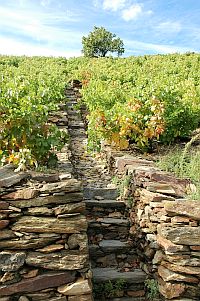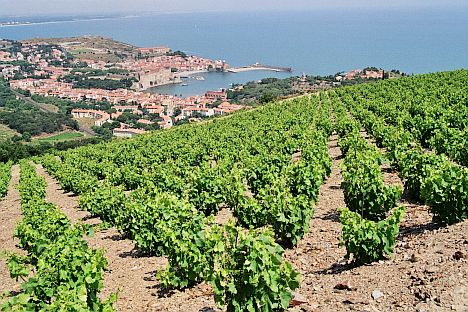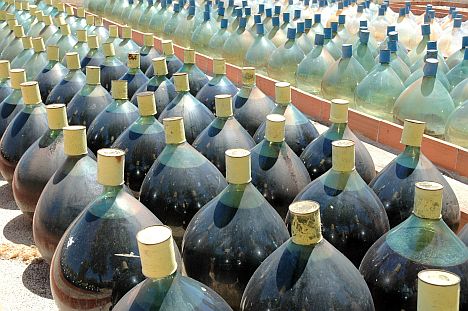Roussillon is one of the most charming and varied areas of France and its southernmost department. In the Golden Age of its history in the 13th and 14th centuries, it was part of the Kingdom of Majorca, which James the Conqueror had pieced together for his peaceable youngest son from the Balearic Islands, the highlands of Cerdagne, Roussillon and Montpellier.
Roussillon has a number of advantages for viticulture, which were already apparent to Greek settlers in the 7th century BC and which today's winegrowers are increasingly able to exploit. Bordered to the south by the Albères mountain range, the foothills of the Pyrenees, and to the east by the Mediterranean Sea, the sun shines for over 2500 hours a year, bringing the grapes to full ripeness. The frequent north-westerly wind Tramontane drives away many vine diseases. Nature makes it easy for the winegrowers to work in an environmentally friendly way, which is increasingly being taken to heart.

|
|
Close to the sea: the stony terraced vineyards
|
The vineyards, which cover a total of 35,000 hectares, extend from low stony terraces in the plain higher and higher up to about 600 metres above sea level. In this way, they form a gigantic amphitheatre overlooked by the majestic peak of the Canigou, almost 3000 metres high. The soils are very diverse, containing more or less clay and consisting of gravel,
limestone, gneiss,
granite or slate. The diversity of the natural conditions has been reflected in the recognition of a total of 14 different appellations.

|
|
Slate is common in Roussillon
|
A speciality dating back to the Middle
Ages are the
Vins Doux Naturels with the appellations
Banyuls,
Banyuls Grand Cru,
Maury,
Rivesaltes,
Muscat de Rivesaltes and
Grand Roussillon. Its recipe goes back to the famous
doctor and alchemist Arnau de Vilanova (1240-1311), who belonged to the Order of the Templars and later became rector of the University of Montpellier. He had brought the principle of distillation with him from the Orient on a crusade and experimented with it on the Templar
estate Mas Déu near Trouillas, south of Perpignan. In the process, he discovered the secret of "mutage", the muting, the interruption of fermentation through the addition of wine spirit. This not only stabilised the wine - a much appreciated effect in those days - but also preserved a considerable amount of grape sugar in it, the
Vin Doux Naturel was born, at a time when sweetness was an extraordinary rarity. (This principle is applied to all
fortified wines such as
Sherry,
Port,
Marsala, etc., but it also underlies
aperitifs à base de vin such as
Byrrh, Dubonnet or Saint-Raphael, as well as
Pineau des Charentes or
Floc de Gascogne, among others, in which fermentation is completely stopped by adding wine spirit at an early stage, thus obtaining a so-called
mistelle).
The dry wines are recognised as
Côtes du Roussillon and
Côtes du Roussillon Villages, with four communes having the right to highlight their name: Latour-de-France, Caramay, Tautavel and Lesquerdes. Les Aspres was the
first terroir of the
Côtes du Roussillon to be elevated to its own
appellation, while the dry wines of the
Côte Vermeille, home of the naturally sweet
Banyuls, were classified as
AOC Collioure.
The grape varietiesThe traditional grape varieties in
Roussillon are those that were suitable for naturally sweet wines, namely
Grenache in the three varieties
Blanc,
Gris and
Noir and the white
Macabeu and
Malvoisie as well as Muscat à Petits
Grains and Muscat d'Alexandrie. For simple dry reds, the
robust Carignan and, to a lesser extent,
Cinsault and the rare Lladon Pelut, a variant of
Grenache Noir, were added. For the appellations
Côtes du Roussillon and
Côtes du Roussillon Villages, which were granted in 1977, the
winegrowers made great efforts to improve the varietal range for dry wines by planting mainly
Syrah,
Grenache Noir and, to a lesser extent, Mourvedre. The early-ripening
Syrah in particular has largely established itself in
Roussillon and now determines the character of
most red wines, even though, according to the rules of the
AOC, it must always be blended with two other varieties.
The sales difficulties of the
Vins Doux Naturels, which were the
aperitif of the little man in
France until the 1980s, have led many producers to press red wines from the grapes of the old
Grenache and, to a lesser extent,
Carignan vines used for this purpose. This is true both for the vineyards of the coast, to which
Collioure owes its boom, and above all for the vineyards in the
Maury area. There, the number of independent
winegrowers who dropped out of the cooperatives has quadrupled since 2000 to around 150, attracting a number of investors. This development has contributed significantly to the remarkable upturn in the quality of
Roussillon wines in recent years.
For white wines, the traditional varieties of
Macabeu,
Grenache Blanc and
Gris are available, complemented by the new introduction of
Marsanne,
Vermentino and Roussanne.
Malvoisie or
Tourbat du
Roussillon, widespread in earlier times, has not yet experienced a real renaissance despite its undeniable qualities such as high acidity and complex aromatics. In contrast, some talented winemakers have recently demonstrated that old vines of
Grenache Blanc and
Gris as well as
Macabeu can be used to produce white wines of great finesse and captivating character.
In addition to AOC wines, Roussillon produces country wines that are bottled as Vin de Pays des Côtes Catalanes or Vin de Pays d'Oc. The third option, Vin de Pays des Pyreénées Orientales, is rarely used. In particular, the grape varieties Cabernet Sauvignon, Merlot and Syrah are used for red country wines, while Chardonnay dominates among the white ones. Muscat sec, which is made from the vin-doux-naturel varieties Muscat à Petits Grains and/or Muscat d'Alexandrie, has a special position. With its aromatic intensity, it is particularly recommended as a pleasant, light aperitif.



